16 Back To School Tips Every Student Must Know About
Sep 19, 2024

YouLearn Team
As summer winds down, a familiar rhythm returns. Stores stock up on notebooks and pens; schedules fill up with back-to-school activities. For some, the transition from summer to school is smooth and easy. For others, it can feel overwhelming. You're not alone if you want to learn how to become a better student.
These back-to-school tips can help you ease into the new school year. For instance, did you know that personalized learning through AI could help you get organized and tackle complex subjects? I can help you access this valuable resource.
Table of Contents
What Things Do I Need To Go Back To School?

You will need a few basic supplies to survive the next school year. Here’s a quick list:
Backpack Pens and Pencils
Stick them in a striking pencil case to stay organized
Student Planner
Essential for staying on top of your schedule. Check out the digital version of MyStudyLife, which can be used on your laptop and phone. It smoothly syncs between devices, so you always remember a class or your homework again.
Sharpener Notebook
Lined ones are usually the best.
Eraser White-out Ruler Glue Sticks Water Bottle
Remember to stay hydrated. Check with your school if you need simple or graphic Scissors Binders.
Folders
keep your papers neatly together instead of crumpled in your backpack.
Lunch Box
be sure to pack many healthy brain foods to keep you mentally sharp.
Gym Bag
Gym shoes
Essential Extras for Organization and Study Skills
Highlighters
Who doesn’t love a splash of color?
Sticky notes
These help you remember significant bits of information on the page. Index cards – these colorful squares of cards are helpful study tools.
Padlock
Depending on what kind of locker you’re given
Lanyard
This plastic square holds your school ID or swipe card, which goes around your neck, so you don’t lose it if it’s something you need every day! Hat, scarf, gloves, or sunblock – be prepared for the weather, whatever it is!
Name labels
For your pencil case, calculator, and other bits and bobs
Tissues Hand sanitizer
Reusable cup
Take a reusable cup if you’re fueling your early mornings with coffee or tea.
Compass and protractor – check whether you need these for math
Going Digital: Tech You May Need for School
AI Learning App, YouLearn Laptop Whether you’ll need one in class depends on how tech-savvy your school is. Laptops are also helpful for writing assignments on the go.
A dictionary and thesaurus app
Having a dictionary and thesaurus at your fingertips will improve your essay-writing skills.
Headphones/earbuds are nothing worse than trying to concentrate when others are talking too loudly in the library.
USB Flash Drives
are memory sticks you can plug into most computers. They’re great for transporting documents to and from school and home computers and backing up your assignments.
16 Back To School Tips Every Student Must Know About

1. Use YouLearn AI For Better Learning
YouLearn is your AI tutor, designed to supercharge your learning from YouTube videos, PDFs, and slides. Our AI chats with you about the content provides quick summaries, and breaks information into digestible chapters.
Whether you are a college student or a self-learner, we help you grasp material faster and more effectively. Just upload your content, and our AI transforms it into an interactive learning experience. With YouLearn, you're set to learn more intelligently, not harder. Learn anything with ease for free today with YouLearn's personal AI tutor.
2. Stay Ahead as Long as You Can
When starting new classes, remember that your outlook on this school year can impact your performance all year. It’s much easier to earn an A if you do your best from the start instead of falling behind during the first few weeks and playing catch up the rest of the semester. Mentally prepare yourself to put your best foot forward in the first half of the semester. Try to stay ahead as long as you can. You may be surprised by how far you’ll go.
3. Create a Daily Routine and Stick to It
Put a finger down if you’ve ever woken up less than 15 minutes before heading out the door, leaving little to no time for getting ready, gathering your things, or eating breakfast. Put another finger down if you’ve ever been tardy. We get it. Sometimes, the alarm doesn’t go off. But have you ever noticed that the anxiety of being late or forgetting your homework can derail your entire day? Developing a daily routine will keep you refreshed and focused as you tackle your course load.
This routine will vary depending on your grade level, school, extracurriculars, and any other commitments you have throughout the day (such as a part-time job). A few general tips for creating a daily routine: Set a designated time to wake up, get dressed, and eat breakfast. Follow your class schedule during the day, attending every class and activity.
Remain committed to your extracurriculars, but understand there are limitations to what you can take on in one day. Avoid overloading yourself; communicate with your coach or program director if conflicts arise. Plan the evening to work on homework, projects, test prep, or college applications. Set a designated bedtime to ensure you get plenty of sleep each night. This may seem like common sense, but developing a routine that works for you is an art! Getting into the groove may take some time, but adding structure to your day can help.
4. Make a To-Do List
We recommend setting goals for each day, month, and year. This to-do list may include homework, chores, healthy habits, test prep, creative projects, goals, or other items you plan to accomplish during a specific time frame. Research shows that you are 42 percent more likely to achieve your goals when you write them down.
Start by writing down your daily plans, and see if it helps boost your productivity. Some of our students successfully developed their school planners using the Bullet Journal method. The Bullet Journal is a creative notebook organization system to help you stay on track and better measure your daily successes. It’s also a lot of fun!
5. Keep Track of More Than Just Homework Deadlines
As a high school student, you have a lot on your mind. That’s why we recommend you write down your deadlines in one place. In addition to homework due dates, your school planner should include your test prep schedule, upcoming test dates, extracurricular activities, and scholarship and college application deadlines (if you’re a senior). Try writing things down, and if that doesn’t work for you, explore free digital planning tools like Google Calendar, Apple Calendar, Trello, or other popular tools.
6. Create a Comfortable, Distraction-Free Study Space
Rummaging through a cluttered desk or overhearing family members talking can easily break your focus. Find a quiet, clean space within your home to sit while studying or working on homework. If complete silence is hard to find, use headphones to drown out any background noise. If you lose focus quickly, keep all distractions “out of sight and out of mind.” This may involve placing your gaming console in a drawer, keeping pets in another room, or temporarily shutting off notifications for social media apps.
Another tip is to make sure you are comfortable. Avoid sitting on the couch or in bed, as this may cause you to become sleepy or hold your body in uncomfortable and awkward positions. We recommend sitting at a desk or your kitchen table. Grab a comfortable chair with adequate back and neck support to avoid discomfort. Explore other options if all else fails and you can’t focus in your room. Coffee shops, libraries, and empty fast-food restaurants with free WiFi can also serve as study spaces.
7. Communicate Your Schedule with Family and Friends
Spending time and making memories with your people is essential, especially since the high school years are so fast! But it shouldn’t take away from time spent working toward your college goals. Most of the time, your loved ones will understand if you have to focus on your homework before you can hang out. We recommend sharing your schedule with your friends and family.
They can help plan around your priorities and support you when you’re overloaded with tasks. However, it helps to be considerate—your parents are busy too! Keep them happy by learning how to prioritize needs at home alongside your school schedule. Try looking at it this way: good time management is an important life skill you will need in college.
8. Take Breaks
For some students, studying takes work. Sometimes, we need more focus, even when we carve time out of our day for it. If this sounds like you, try to trick your mind by pairing this not-so-fun task with something you enjoy. For every hour or so you spend working on a task, give yourself a little break to do things you love.
For example, if you spend an hour studying for an upcoming math test, give yourself a pat on the back by enjoying your favorite snack, taking a short walk, or watching an episode of your favorite show. Breaking up your study time will prevent brain drain and help you avoid procrastination. But for this to work correctly, you must intentionally manage your breaks and ensure the task merits the reward. For instance, one hour of studying shouldn’t result in four hours of TV.
9. Stay Engaged by Participating and Asking Questions
Attending classes day in and day out can be challenging for staying engaged. Writing your notes can help you follow along and remain alert throughout class. And don’t be afraid to speak up! Answering your teacher’s questions will help you retain what you’re learning, identify areas you need to spend more time on and support your teacher and classmates in remembering you.
It’s a lot easier to get an extension on a research paper or find partners for group projects if I’ve been present and participated throughout the class. Remember, the more interactions I’ve had with a teacher, the more likely they’ll be willing to write me a letter of recommendation for my college applications.
10. Ask for Help
Another benefit of getting to know your teachers is that I can go to them when I have trouble understanding a concept or need more direction on a school project or essay. If I’m struggling, don’t be afraid to ask for help! If you can’t catch them after class, send an email, see them before or after school, or schedule a time for you to work on a problem one-on-one.
Remember, the sooner you ask for help, the better. If I recognize that I’m starting to fall behind early in the semester, there’s a better chance of catching up before the midterms or finals. Your teachers are experts in the subject and support you throughout your learning. Often, they’ll have a better grasp on the content than a parent who hasn’t touched trigonometry or calculus in over 20 years (but let’s give a shoutout to all the amazing moms and dads out there trying to brush up on complex subjects to help—we know it’s tough not always having the answers).
11. Try to Socialize Every Day
A high school education should extend beyond academics. Knowing how to socialize and interact with others is an important skill many colleges and employers look for in applicants. Remember to try to communicate with your friends regularly or look for ways to make new friends. School clubs are a great place to start!
12. Stay Involved
How you spend time outside school is essential to your college application. Many sports and student organizations, like debate or drama clubs, look for new participants yearly. Our best advice here is not to be afraid to try something new! However, be mindful of your ability to juggle multiple commitments. It’s okay to try many new extracurriculars during your freshman year of high school. Remember that as your courses become more challenging, the time will come to decide which ones you like best.
13. Plan Ahead for the SAT®, ACT®, or PSAT Tests
While some colleges will not require a test score when submitting applications for general admission, the vast majority will still look at them when reviewing college applications. Several prominent colleges have returned to test-required admissions.
Even if a college is test-optional for general admission, it may still require test scores for many of the more selective aspects of the admissions process, such as scholarships, in-state tuition, honors college placement, or admission to a competitive degree program.
Since test scores will continue to play a significant role in college admissions, it’s essential to plan when registering for upcoming tests. At KD, we offer prep courses for the PSAT, SAT®, and ACT® tests to help students reach their college goals.
14. Use Your Time Wisely
As mentioned, time management is an important life skill that impacts high school and college performance. During these formative years, small acts like learning how to show up on time or planning so you can follow through with your commitments will give you the discipline necessary to achieve goals throughout your life.
Productivity can also happen in your free time. Learning a new skill, practicing a dance routine, exercising, working on arts and crafts, or taking a free online course are all productive ways to spend a weekend afternoon. Small activities like these can also help you find peace and positivity.
15. Find Healthy Ways to Manage Stress
The high school years are stressful. In a 2014 study by the American Psychological Association, teens, on average, reported that their stress level during the school year far exceeds what they believe to be healthy. In 2020, the same organization reported that nearly half of teenagers said COVID-19 made them feel like it’s impossible to plan for the future. If you’re experiencing high stress levels, maybe it’s time to step back, take a deep breath, and evaluate your feelings. We all strive to be happy, but sometimes, that goal remains outside our grasp.
For tips on better managing stress, check out our post “How to Be Happy Anywhere (Even School),” written by a former KD student. Sometimes, stress becomes more than we can handle on our own. There’s no shame in seeking help. If you need help and don’t know where else to go, start by taking advantage of these free mental health resources for teenagers.
16. Explore Potential Majors and Career Paths
It seems unfair to force students to decide what they’ll do for the rest of their lives when there’s still so much to learn about the world. However, the college and job system rewards students who have matured enough to make this decision at 17 or 18. For example, competitive degree programs and career-specific scholarships want to know that you’ve decided on a college major.
This choice becomes more manageable if you’ve dedicated time to trying new things and pursuing particular middle and high school interests. Some students know from a young age. Others must find inspiration through extracurriculars, contests, or a passionate teacher with a contagious appreciation for a particular subject.
Related Reading
• How to Be a Good Student
• How to Pass a Test
How Do I Prepare For Back To School

1. Get Your Life Back on Schedule
Families usually get a break from their regular routines when school is out for summer break. Now that it’s almost time to return to school, it’s a good idea to get back on track slowly. About a week or two before school starts, re-establish your family’s routines so the transition back to school is smooth.
Determine a regular bedtime, set a morning alarm, limit screen time, and establish a plan for homework and chores. Easing into these routines before the school year starts helps children settle back into their habits smoothly.
2. Encourage Healthy Breakfast Habits
Speaking of routines, encourage your children to begin their day with a healthy breakfast. Not only will they have more energy to get through the school day, but they’re also more likely to eat healthier overall, have improved brain function, and experience less restlessness. If breakfasts aren’t part of your child’s typical morning routine, start incorporating them before the school year begins to encourage this healthy habit.
Don't overthink the meal if your mornings are short on time — as most busy parents’ mornings are. Your child’s breakfasts don’t need to be gourmet or time-consuming. Grab-and-go items are outstanding as long as they’re nourishing. Add individual yogurt or applesauce cups and pair them with a banana, breakfast bar, or dry cereal.
Other healthy, low-fuss breakfast choices include toast, cold cereal with milk, instant oatmeal or grits, fresh fruit, and smoothies. When time allows, you can make double or triple batches of pancakes or waffles to freeze for easy morning meals throughout the week. If your kids are old enough to use the toaster, they can even reheat them independently.
3. Get School Supplies Early
Don’t wait until the day before school starts; get a head start on back-to-school shopping this year and cross it off your family’s to-do list. Set your child up for a successful start to their school year by sending them off to the first day of class with everything they’ll need to thrive. Shopping for back-to-school supplies will often help your child feel excited for the upcoming school year.
4. Reach Out to Teachers
Don’t be afraid to introduce yourself to your child’s teacher. Send them an email before the start of the school year and let them know if there are any specifics they should know about your child. Having an open line of communication as the year progresses will benefit all parties: parents, teachers, and children.
5. Pack Healthy Lunches Ahead of Time
Pack your children’s lunches the night before to minimize the morning rush. You can make this an after-dinner routine and have your children help select their food for the next day, or you can pack lunch boxes after bedtime. Once you’re done, place the lunchboxes directly in your child’s backpack or refrigerate them if necessary, and they’ll be ready to go in the morning.
If your child is just beginning school, you can ease them into the lunchtime routine by providing packed lunches during the summer.
6. Set Up a Homework Station
For some kids, completing their homework is a breeze, but others may need more encouragement and assistance. If your child has difficulty focusing, creating a distraction-free space to focus on their assignments is essential. It doesn’t matter whether it’s a seat at the dining table or a dedicated study room, as long as it’s a quiet space where your child can complete homework and projects without getting side-tracked by toys, pets, television or other people.
7. Implement Boundaries
With all the bustle the school year brings, it’s crucial to implement boundaries for your children. For example:
Set a curfew for older kids, especially on school nights
Limit screen time and explain that they must complete their homework and chores first
No playdates on school nights
Decide on the best boundaries for your family and stick to them.
8. Plan Outfits the Night Before
Minimize your morning rush in any way you can. One easy way to do so is by pre-planning your child’s outfit the night before. Take a few minutes each night before bedtime to set clothes aside so they’re ready to go for the following day. If your children are old enough, have them incorporate this into their nightly routine.
9. Schedule Family Time
Schedules are often tight during the school year. Between homework and extracurricular activities, it might be difficult at times to find time for other activities. Dedicate a regular portion of time, whether immediately after school, in the evenings, or even on the weekends, to catch up with your children. Show them you’re interested in what’s going on with their lives and create the opportunity for open communication with them.
10. Don’t Forget the Physical
Schedule your child’s back-to-school physical now and begin the school year on a healthy start. Back-to-school physicals are a great time to ask questions and update your child’s physician on anything about your child that may concern you. It’s also a convenient time to screen for common childhood conditions, ensure up-to-date immunizations, and get an EKG screening to see if your child plans to play a school sport.
YouLearn's Your personal AI Tutor
YouLearn is your AI tutor, designed to supercharge your learning from YouTube videos, PDFs, and slides. Our AI chats with you about the content provides quick summaries, and breaks information into digestible chapters.
Whether you are a college student or a self-learner, we help you grasp material faster and more effectively. Just upload your content, and our AI transforms it into an interactive learning experience. With YouLearn, you're set to learn more intelligently, not harder. Learn anything with ease for free today with YouLearn's personal AI tutor.
Related Reading
• Tips for School
• How to Do Good in School
• Study Strategies for High School Students
• Best Study Method
• College Study Tips
• Active Study Methods
10 Best Must Have Back To School Tools For Students
1. Enhance Learning With YouLearn AI

YouLearn is an AI-powered personal tutor that can enhance the way students study. YouLearn can help you supercharge your learning from YouTube videos, PDFs, slides, and other content. With YouLearn, you simply upload your materials, and an AI transforms them into interactive learning experiences. The tool breaks information down into digestible chapters, provides quick summaries, and lets you chat with it about the content to boost retention and understanding.
2. Write Better Papers With Grammarly
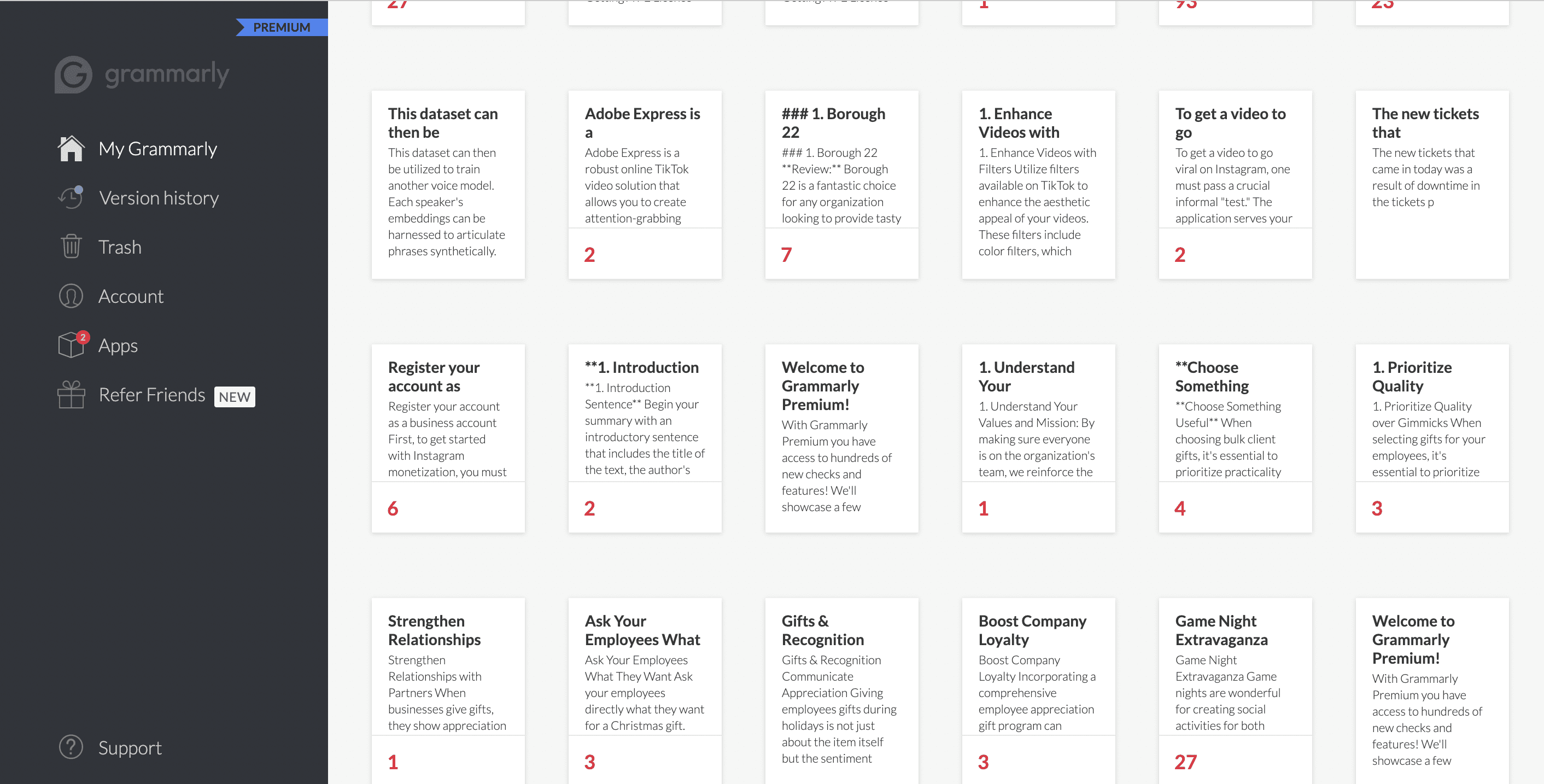
Grammarly is a powerful online tool that helps you write with confidence. It provides real-time feedback on your writing so you can ensure it's clear, accurate, and error-free. Grammarly can help students in numerous ways, such as improving their writing quality, reducing errors, and improving overall writing.
Pros
Grammarly is free to use and has an easy-to-use interface.
The tool is accurate, reliable, and available as an extension and integration.
Cons
Grammarly doesn’t support multiple languages, and some features may require a paid subscription.
3. Master Your Classes With Khan Academy
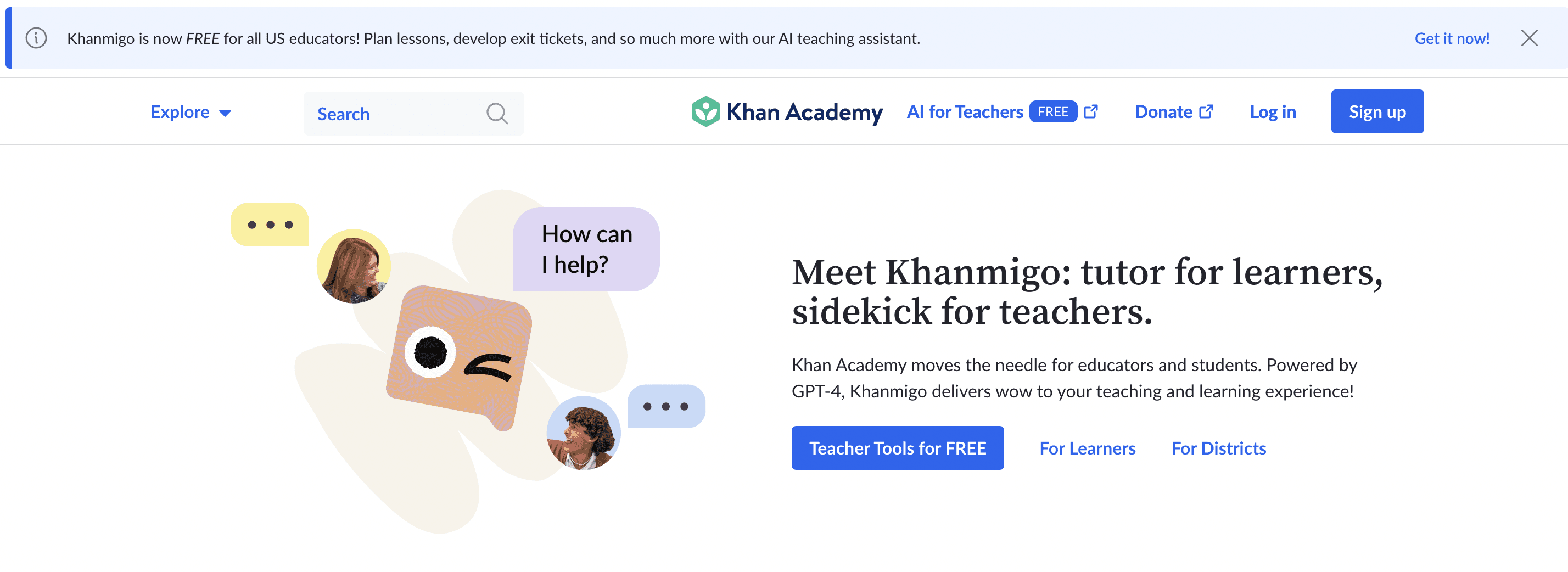
Khan Academy is another online study tool that offers a wide range of courses taught by experts. You can use the app to learn new skills, brush up on existing ones, prepare for a test, and more. It also lets you track your progress and learn at your own pace. What’s better is that it is entirely free.
Pros
Khan Academy gives you access to reputed course material and resources.
You can track your progress, choose various courses, and learn quickly.
The platform even helps you prepare for tests like the SAT, MCAT, etc. Plus, there’s AI tutoring and gamification for interactive and fun learning.
Cons
Some users have complained about the complicated user interface and lack of personalization.
4. Collaborate Effectively with Google Docs

Google Docs is a cloud-based online document creation, editing, and storage platform. It is part of the Google Drive suite of applications and offers a range of features to help users create, collaborate, and store documents online.
With Google Docs, students can efficiently work on projects and collaborate with multiple people in real-time from any device with an internet connection. For example, if a team of students is working on the same project, they can easily create and share a document through Google Docs that everyone can work on and make changes to.
Pros
Google Docs is easy to use and navigate. It provides secure online storage for documents and allows access from any device.
The platform supports a wide range of templates for writing and editing.
Cons
Google Docs has limited features compared to other word processors.
There’s no offline access.
5. Study Smarter with Quizlet
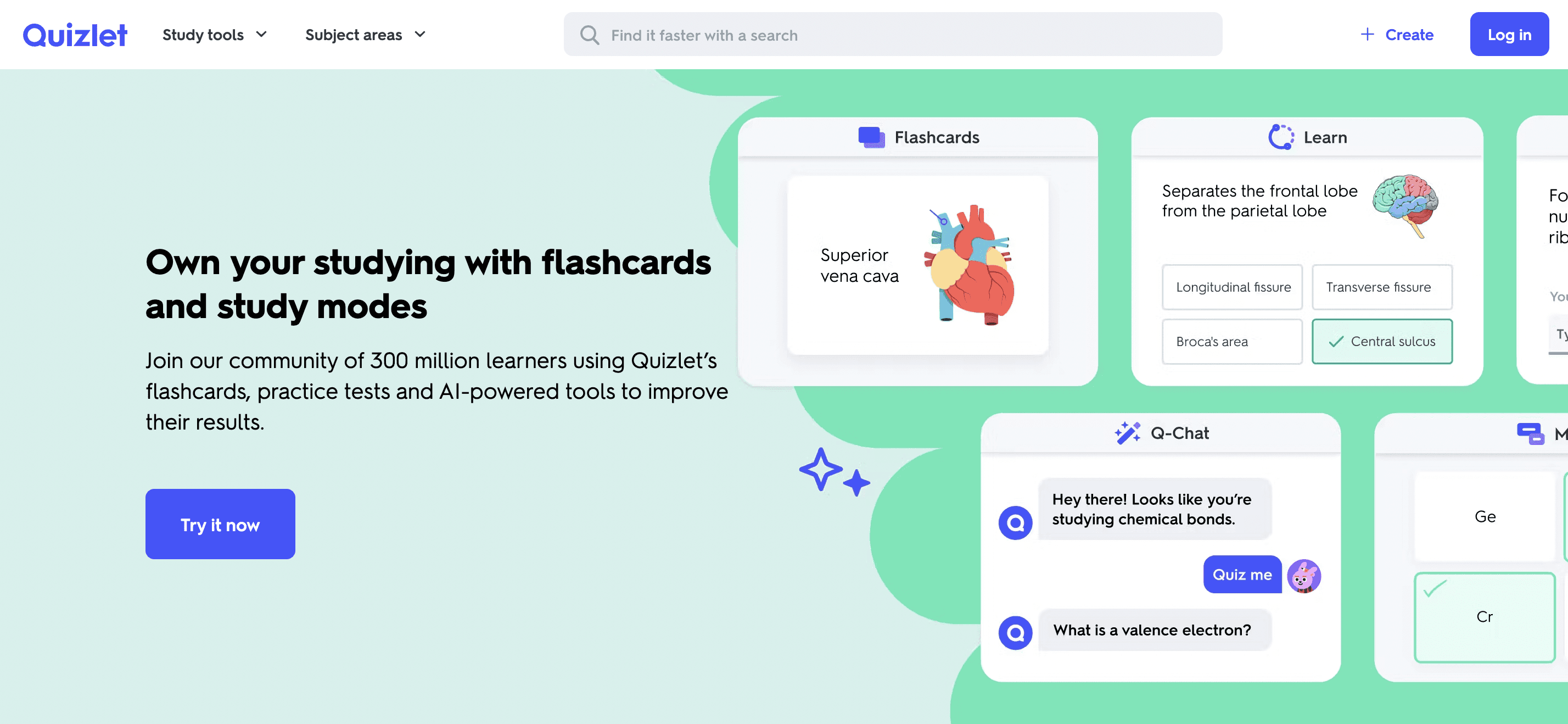
Quizlet offers several helpful online study tools that make it essential to students’ lives. From interactive flashcards to comprehensive study resources, it makes education and learning fun. It has over 250 million pre-made study sets. You can also create and share your flashcards with others for better collaboration.
Pros
Quizlet covers many subjects, including physics, French, and science. It enables progress tracking, allows you to convert your notes into personalized quizzes, tests, and flashcards, and offers custom study routines, ad-free learning, and offline access in the premium version. The tool integrates with Google Classroom, providing AI tutoring and personalized help.
Cons
Some content uploaded by users may be inaccurate, and live tutoring is unavailable.
6. Stay Organized with PowerSchool

PowerSchool is an all-in-one educational platform designed to streamline communication between students, parents, and teachers. It helps students stay on top of their school life by giving them real-time access to their academic information, such as grades, attendance, assignments, and more.
Pros
PowerSchool streamlines communication for better organization.
It gives students real-time access to academic information and helps them stay organized.
Cons
PowerSchool can be expensive and may have technical issues.
7. Get Flashcard Solutions with Chegg
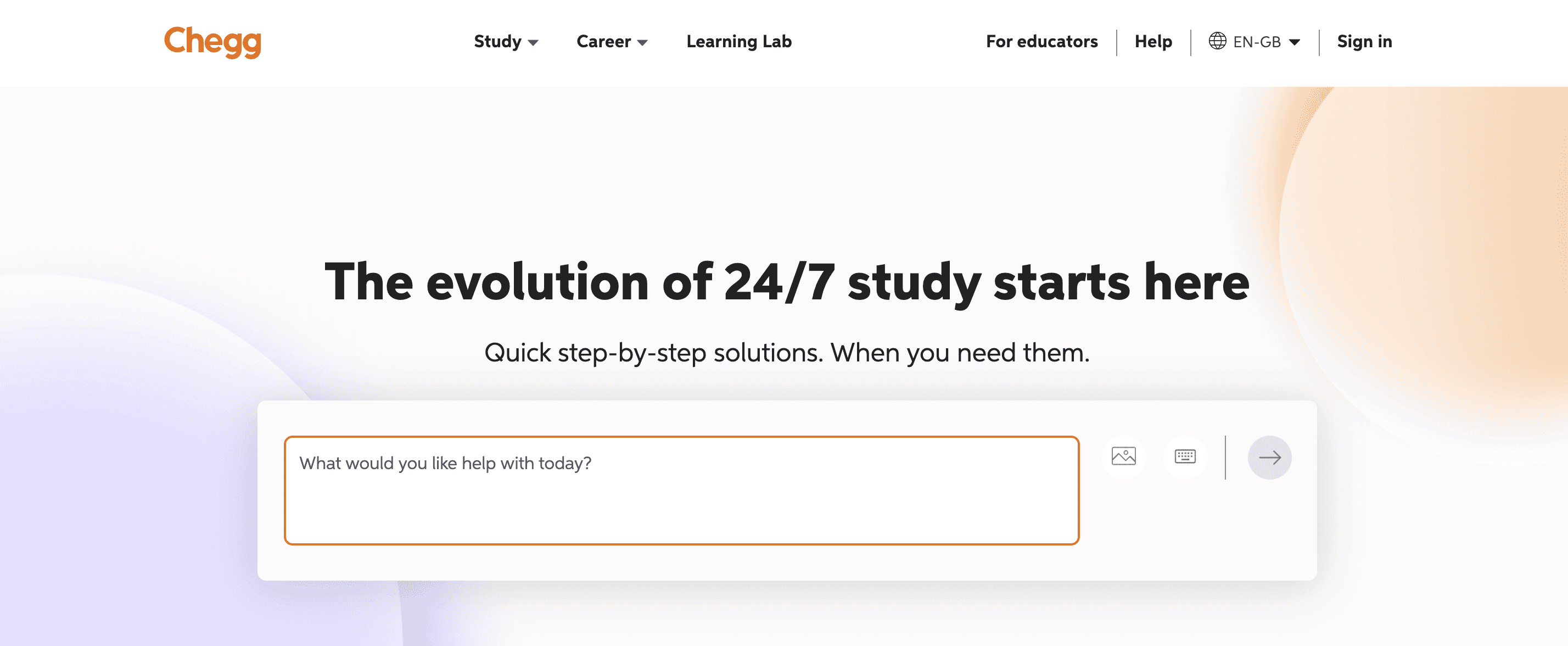
Chegg has a vast repository of flashcards (over 500 million!) to help you study better and more innovative. You can get flashcards for almost all subjects, whether religion or medicine. What’s more, you can easily create new flashcards if you do not find the ones that are relevant to you. Chegg also offers homework solutions, grammar assistance, textbook explanations, AI-powered writing tools, and much more for students.
Pros
With Chegg Flashcards, you can create your own flashcards or use premade ones.
You can access learning resources, including guides, step-by-step solutions, and more.
You can use it as a focus app and get experts to verify solutions.
Cons
Chegg flashcards can have inaccurate information.
8. Improve Your Writing with Editpad
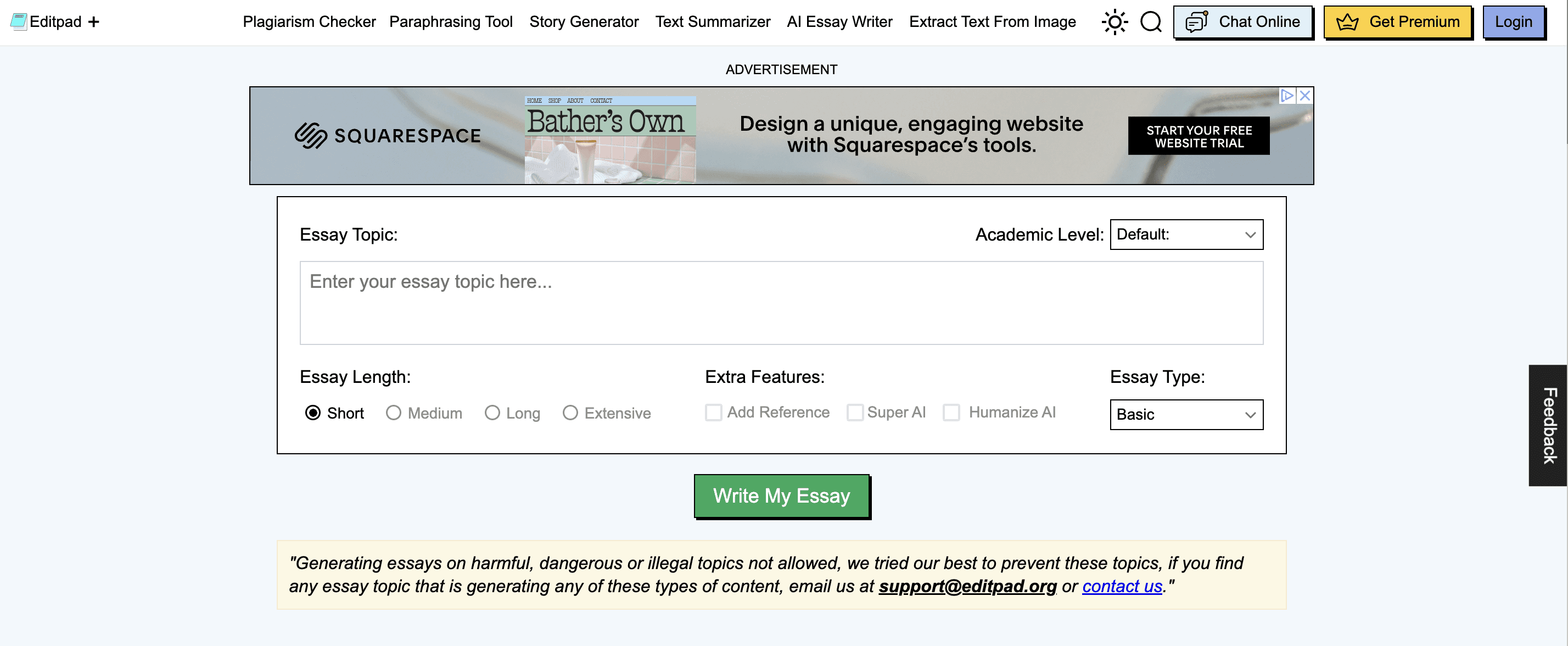
Editpad.org is a unique online tool that provides students with a powerful text editor for writing projects and assignments. It’s great for students who want to take their writing to the next level, as it provides a wide range of features to help them finish their work quickly and efficiently.
Pros
Editpad is easy to use and navigate. It allows students to save their work quickly and easily, check out the content's originality, and paraphrase it.
Cons
Editpad does not allow collaboration in real-time.
9. Get Answers with ChatGPT

ChatGPT is a relatively new study tool on the market. However, it is undoubtedly among the most popular ones. You can study complex concepts in easy-to-understand language, ask ChatGPT to summarize long essays and much more. All you have to do is give a clear prompt to the tool, and it will immediately generate answers for you.
Pros
ChatGPT can help summarize long articles and essays, generate ideas for creative writing, explain complex concepts in straightforward language and with examples, and summarize class notes for quick understanding.
It also helps identify language errors and provides multilingual support.
Cons
Some information can be inaccurate, and ChatGPT can generate repetitive results.
10. Impress Your Class with Prezi
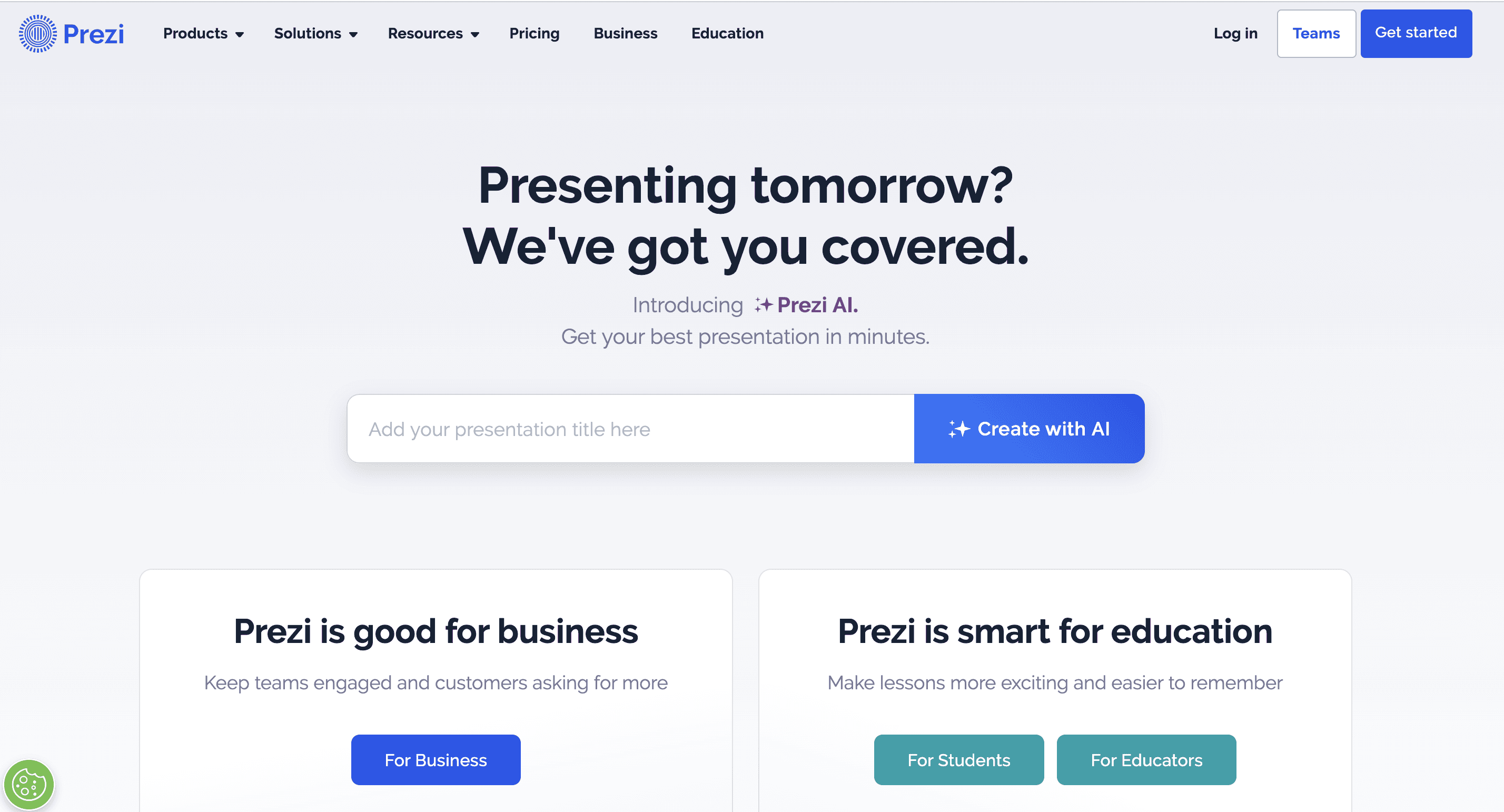
Prezi is cloud-based presentation software that allows users to create visually stunning, interactive presentations. It is designed to help students and businesses present their ideas engagingly and interactively. Millions of people around the world have used Prezi to create effective and engaging presentations.
Pros
Prezi is easy to use and navigate. It has many interactive features and animations, allowing real-time collaboration and sharing. You can use it to create visually stunning presentations.
Cons
Prezi can be limited in customization and may require an internet connection.
How To Survive The First Day Of School

Sleep Well for School Success
A good night's sleep can make or break the first day back at school. To wake up refreshed and ready to tackle the day ahead, get to bed early the night before. On the morning of your first day back at school, wake up early so you have enough time to eat breakfast and reduce any lingering tiredness. Eating a balanced breakfast, rather than sugary foods, will boost your energy levels and improve your focus.
For example, eggs on toast with some avocado and a glass of milk would provide a variety of nutrients to help fuel your body and brain. If you have trouble falling asleep the night before, try listening to a calming podcast to help take your mind off any anxious thoughts. Reading a book or sipping herbal tea, such as peppermint, can also help. Experiment with different strategies and find what works best for you.
Be Yourself and Have Fun
Don’t shy away from introducing yourself to new people on the first day of school. Yes, making new friends can be daunting, but the first day is the perfect time to jump out of your comfort zone. Not only will you meet new people, but you may also create long-lasting friendships by doing so. Even if you don’t become close friends with that person, at least you tried to meet someone new.
Ask Questions
Students should always ask questions on the first day of school. Teachers and staff are there to help you, so make them work hard and ask questions! It does not matter if your question needs to make sense, as your goal should be to understand the material, benefit from your learning, and challenge yourself while having a growth mindset.
Learn Anything With Ease for Free Today with YouLearn's Personal AI Tutor
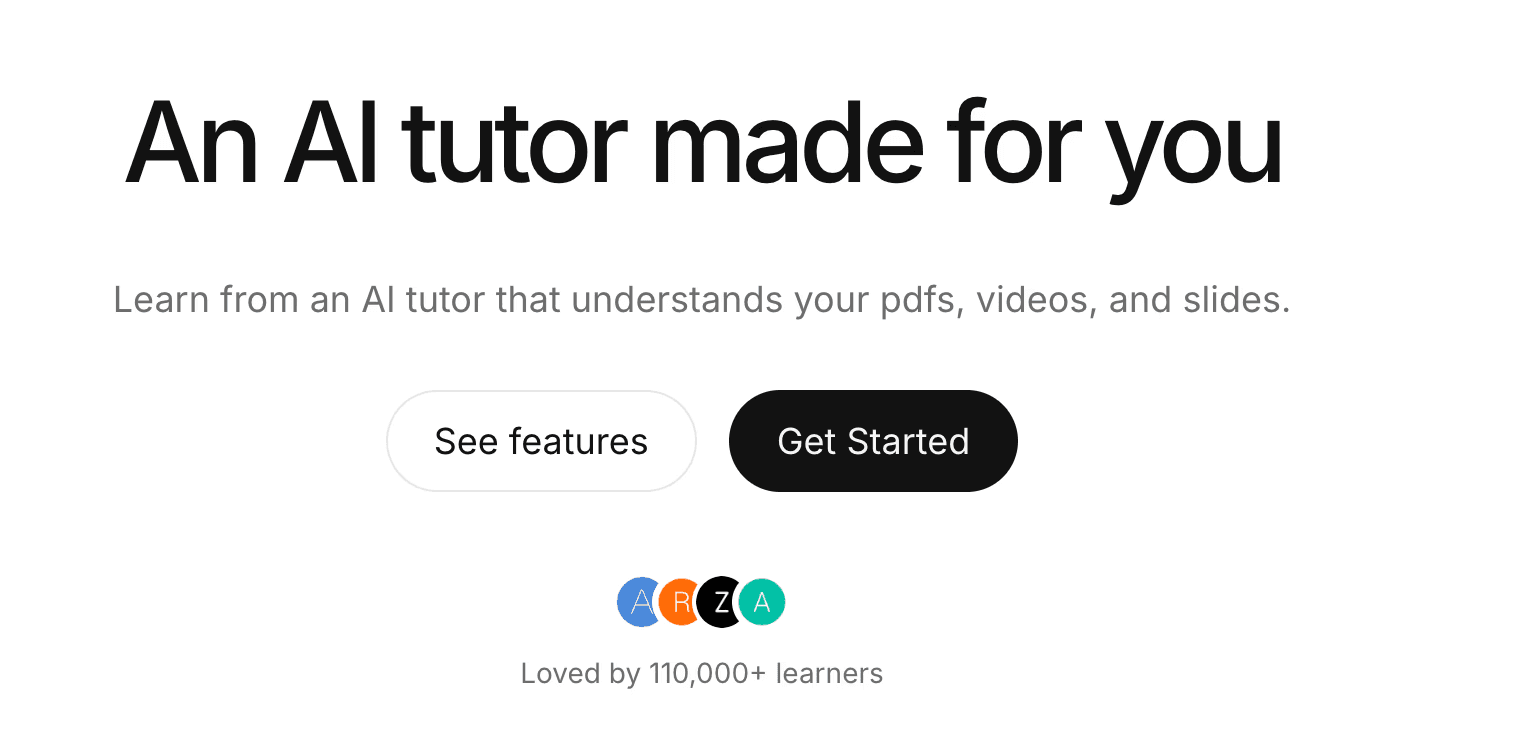
YouLearn is your AI tutor, designed to supercharge your learning from YouTube videos, PDFs, and slides. Our AI chats with you about the content, provides quick summaries, and breaks information into digestible chapters. Whether you are a college student or a self-learner, we help you grasp material faster and more effectively. Just upload your content, and our AI transforms it into an interactive learning experience.
With YouLearn, you're set to learn more intelligently, not more intricate. Learn anything with ease for free today with YouLearn's personal AI tutor.
Related Reading
• High School Tips
• High School Study Skills
• How to Pass School
• How to Study Better in College
• How to Study by Yourself

